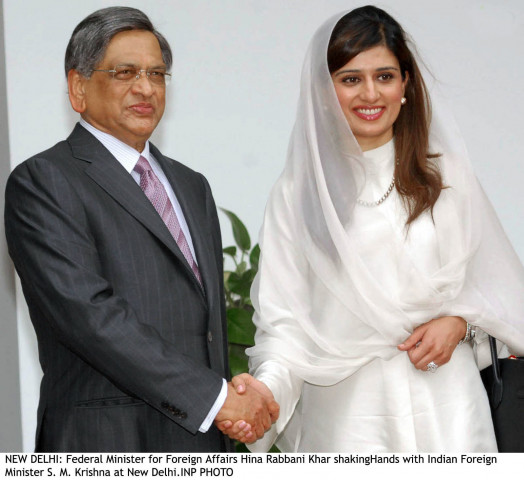Ms Khar’s ‘eight points’ on Pakistan-India
It appears the world expects the bilateral equation to get out of the old rut of repeating irreconcilable positions.

Ms Khar’s ‘eight points’ on Pakistan-India
The next round of India-Pakistan talks, Ms Khar says, will discuss the famous eight points representing Pakistan’s view of what is wrong with the bilateral equation: “counter-terrorism; economic and commercial cooperation; the construction of Wullar barrage (what India calls the Tulbul project) that Pakistan thinks will affect the flow of the Jhelum river from Indian Kashmir, the disputed Siachen glacier in Kashmir; the dispute over the maritime boundary at Sir Creek; peace and security, including confidence-building measures; the dispute over the Jammu and Kashmir state; and promotion of friendly exchanges.”
Will we go through the old pantomime of clichés in the next round or is there actually a breakthrough waiting for us this time? It appears that the world expects the bilateral equation to get out of the old rut of repeating irreconcilable positions. Newspaper editorials in the US expressed optimism about Ms Khar’s remarks in New Delhi. The rumour was that global diplomacy had put pressure on India to stop stonewalling Pakistan’s efforts at resuming a post-Mumbai phase of dialogue with it. What could be the content of this pressure from Washington and London?
First, there was talk of Pakistan wanting to end its warlike engagement with India on the eastern border in order to be able to face the trouble on its western border effectively. Pakistan’s ‘condition’ for this was India ending the concentration of troops on the Pakistani border before it would withdraw its own troops. On the other hand, India was pressured into changing its stance on the Mumbai attack and the policy line it dictated to the Indian ministry of external affairs. The outgoing Indian foreign secretary who handled this policy surprised a lot of people when she publicly regretted that India had erred in breaking off dialogue with Pakistan after Mumbai.
Ms Khar’s plan to ‘deepen’ the engagement process with India can mean a lot of things if it is not an empty phrase. Pakistan will be resuming its talks with India, which at this point in time, clearly enjoys an advantage in terms of being in a stronger position to negotiate with one of its neighbours. Today’s India, which is pro-status quo, has since added to its negotiating posture more plus points, the most important one being its economic success in parallel to Pakistan’s frighteningly real crumbing of the national economy in the face of its own home-grown terrorism. Its global allies, the US and China, may be on the critical point of reassessing their estimate of Pakistan as a good horse to bet on. The ‘eight points’ are in fact distractions to the urgent bilateral agenda that the two are ignoring. The idea, developed laboriously by now-retired Pakistani diplomats, is that first peace must be created before the two start doing what states at peace with each other normally do: engage in political and economic détente. The truth is that this modus operandi has never worked in history, especially if the two sides have agendas that refuse to gel together because of lack of flexibility. Any agreement will work if each side keeps some space to give the other what it wants. A status quo power with clout will not be willing to accommodate its neighbours partially because it doesn’t need anything from them. Peace is what removes disputes by defusing them. And peace is achieved not by removing disputes but by allowing positive things to happen. The big thing waiting for this wisdom to dawn is free trade and trade routes. A ‘connecting state’ — east-west and north-south — such as Pakistan is geopolitically important only if it allows goods and people to pass through its territory. In military thinking, geopolitical importance is attained by blocking the transit of goods. Nothing could be more wrong.
Published in The Express Tribune, August 11th, 2011.














COMMENTS
Comments are moderated and generally will be posted if they are on-topic and not abusive.
For more information, please see our Comments FAQ